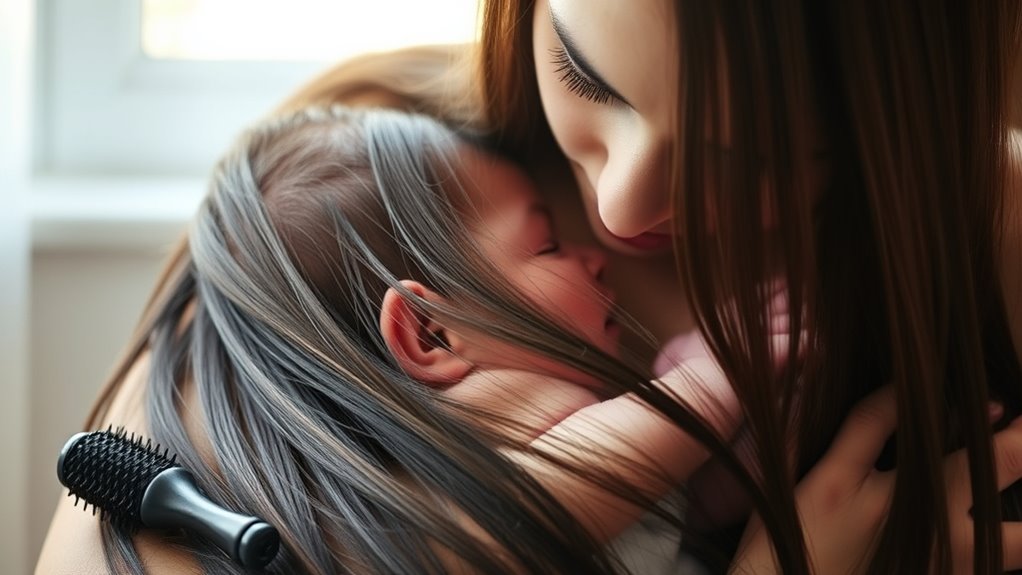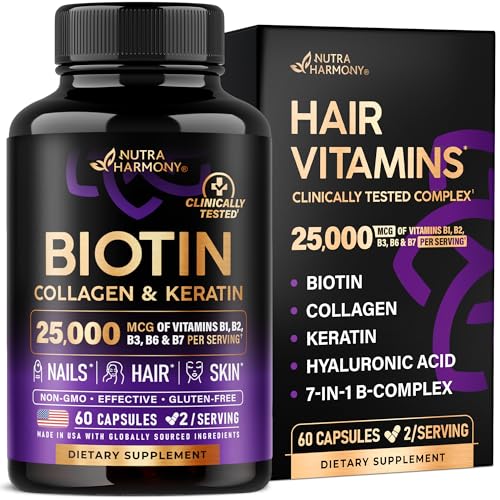Postpartum hair loss is a common experience for new moms, typically starting around four to five months after childbirth. It happens due to hormonal shifts, particularly a drop in estrogen, causing excess shedding. You might notice more than 100 hairs falling out daily. While it’s concerning, this phase usually lasts six to twelve months, and your hair should regain its former fullness. Want to discover tips for managing this process and promoting recovery?
Key Takeaways
- Postpartum hair loss is a common issue due to hormonal changes, typically starting four to five months after giving birth.
- A decline in estrogen levels triggers hair to enter the shedding phase, resulting in daily losses exceeding 100 hairs.
- Stress and nutritional deficiencies can worsen hair loss, making emotional well-being and a balanced diet crucial for recovery.
- Regrowth usually begins a few months after shedding, with new hair appearing around the baby’s first birthday, often called “baby bangs.”
- The shedding phase is temporary, and hair generally returns to its pre-pregnancy state within six to twelve months.

When you welcome a new baby into your life, you might notice a surprising change in your hair. This phenomenon, known as postpartum hair loss, is something many new mothers experience. Typically, it starts around four to five months after childbirth, triggered by significant hormonal changes in your body. The drop in estrogen levels, which had been elevated during pregnancy, causes many of your hairs to enter the telogen effluvium phase, leading to noticeable shedding.
Postpartum hair loss is common, often beginning four to five months after childbirth due to hormonal changes.
During pregnancy, the rise in estrogen prolongs the anagen phase of your hair growth cycle, allowing your hair to become thicker and fuller. However, once you give birth, the sudden decline in these hormones flips the script. You may find yourself losing more than 100 hairs daily during this shedding phase, which can be alarming. This hair loss usually lasts anywhere from six to twelve months before your hair returns to its pre-pregnancy state. Incorporating essential oils like rosemary oil, known for stimulating blood circulation, may enhance your hair follicle health and support regrowth. Engaging in practices that promote energy efficiency in your lifestyle can also contribute to your overall well-being during this time. Additionally, maintaining a diet rich in essential nutrients can help support your hair’s recovery.
It’s essential to understand that while postpartum hair loss is a normal physiological response affecting about half of all new mothers, certain factors can make it worse. Nutritional deficiencies, for instance, can exacerbate hair loss. If your diet lacks essential vitamins and minerals, it may hinder your body’s ability to support hair regrowth and recovery. Additionally, digital literacy programs can help new mothers share experiences and tips through social media, potentially alleviating feelings of isolation related to this change.
Stress, a common companion to new motherhood, can also impact your hair growth cycle and worsen shedding.
After the shedding phase, you can expect hair regrowth to begin a few months later. By around your baby’s first birthday, you might notice new strands appearing, often referred to as “baby bangs.” This regrowth can be a welcome sight as it signifies that your body is returning to its normal state.
Though the process may feel frustrating, remember that it’s a temporary phase, and your hair will eventually regain its strength.

Baby Blues Postpartum Hair Loss Vitamins – Passion Fruit Gummies with Biotin, Collagen, & Folate
FOR MOMS: The only vitamins specifically formulated for Postpartum Hair Loss
As an affiliate, we earn on qualifying purchases.
As an affiliate, we earn on qualifying purchases.
Frequently Asked Questions
When Will Postpartum Hair Loss Stop?
Postpartum hair loss generally starts to taper off around six months after childbirth.
You might notice that shedding decreases considerably during this period, and by the time your baby celebrates their first birthday, your hair usually returns to its normal thickness.
However, if you find that hair loss continues past twelve months, it’s a good idea to consult a healthcare provider to rule out any underlying health issues.
How to Stop Hair Fall After Pregnancy?
Did you know that during postpartum hair loss, you might lose between 100 to 300 hairs a day?
To help stop hair fall after pregnancy, focus on a balanced diet rich in vitamins and minerals to support hair health.
Consider gentle hair care practices, like using sulfate-free shampoos, to minimize breakage.
Try shorter hairstyles to blend in new growth.
How Much Is Too Much Hair Loss Postpartum?
If you’re wondering how much hair loss is too much postpartum, it’s generally considered excessive if you’re losing more than 100 hairs a day.
During peak telogen effluvium, new mothers can lose up to 300 hairs daily, which can be alarming.
If you notice significant shedding four to five months after giving birth, it’s important to pay attention.
If hair loss continues beyond a year, you should consult a healthcare provider for advice.
Does Magnesium Help With Postpartum Hair Loss?
While you might feel overwhelmed by hair loss, consider the role magnesium plays in your recovery. This essential mineral supports hormonal balance and helps manage stress, both crucial for healthy hair growth.
You can find magnesium in leafy greens, nuts, and whole grains. By incorporating these foods into your diet, you not only nourish your body but also create a foundation for healthier hair, allowing you to embrace your postpartum journey with confidence.

Mielle Organics Rosemary & Mint Hair Oil – Strengthening Biotin Oil Infused Frizzy & Damaged Hair Care – Split Ends & Dry Scalp Treatment to Support Longer, Healthier Strands, 2oz
Award-Winning Treatment – Our Rosemary Mint Scalp and Hair Oil is a nutrient-rich, intensive formula that blends biotin,…
As an affiliate, we earn on qualifying purchases.
As an affiliate, we earn on qualifying purchases.
Conclusion
In the journey of motherhood, it’s natural to face challenges like postpartum hair loss. Remember, “This too shall pass.” Your hair may thin now, but it’ll eventually return, often healthier than before. Embrace this phase as part of your beautiful transformation. Take care of yourself, nourish your body, and be patient. Just as flowers bloom after winter, your hair will regrow, symbolizing the strength and resilience that comes with nurturing new life.

Mama’s Select Postpartum Hair Loss Vitamins – Reduce Shedding, Restore Thickness, Shine, & Strength – Supports Hormonal Balance, Cellular Renewal & Scalp Health – Treatment Is Safe for Breastfeeding
TARGETED POSTPARTUM HAIR SUPPORT – Specifically formulated for new moms, this daily supplement helps reduce postpartum shedding while…
As an affiliate, we earn on qualifying purchases.
As an affiliate, we earn on qualifying purchases.

NUTRAHARMONY Biotin | Collagen | Hyaluronic Acid | Keratin – Support Normal Hair Growth Cycle – Skin & Nails – 25000mcg Vitamins B1, B2, B3, B6 & B7 – for Women & Men – Made in USA | 60 Capsules
BIOTIN, COLLAGEN & KERATIN — a beauty multicomplex of Biotin, Collagen, Keratin, Hyaluronic Acid, Vitamin B-complex, Vitamins A…
As an affiliate, we earn on qualifying purchases.
As an affiliate, we earn on qualifying purchases.









